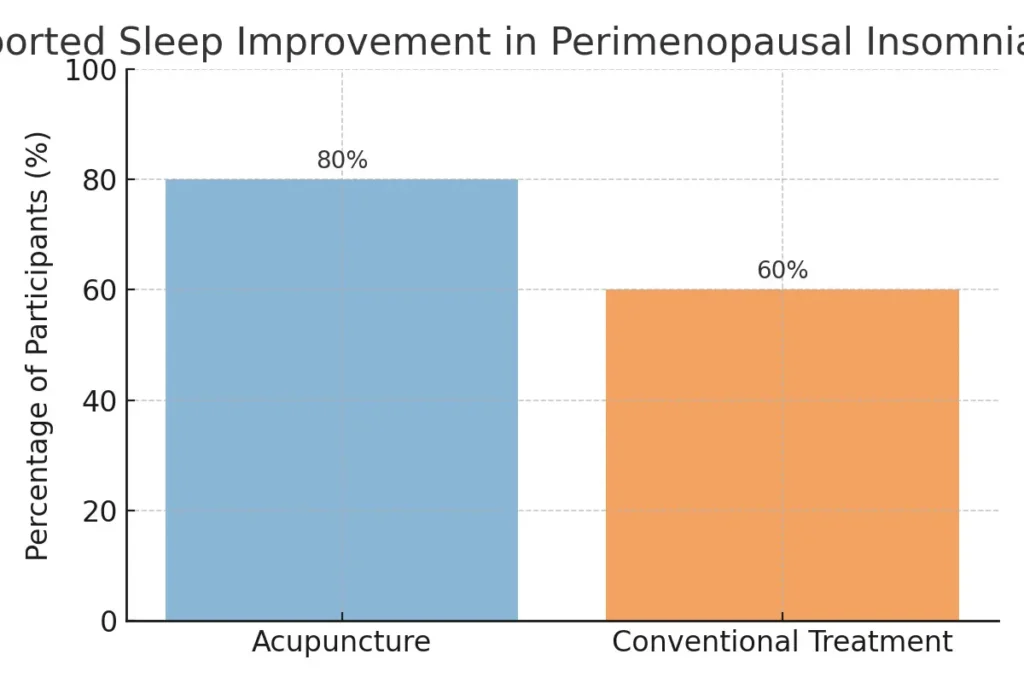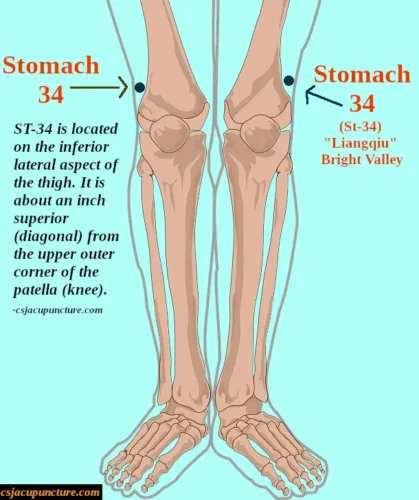This post may contain affiliate links and ads in which we may earn a small percentage of purchases.
Table of Contents
For many women, the years leading up to menopause bring more than just hot flashes and hormonal shifts — they can also bring long, restless nights.
What is Postmenopausal Insomnia?
Perimenopausal insomnia is more than the occasional bad sleep. It’s a chronic condition that can leave you feeling exhausted, irritable, and mentally drained, often lasting months or even years.
The usual medical approach often involves hormone replacement therapy or sleep medications. While these can provide relief, they also come with potential side effects and the risk of dependence. This has led many women to explore other options — and acupuncture is one of the most popular.
The Research
A recent systematic review published in Frontiers looked at research from both Chinese and Western biomedical databases to answer a simple question: Does acupuncture for perimenopausal insomnia provide any relief when compared directly to standard Bio-medicine / treatments?
Researchers gathered nine high-quality clinical trials, with nearly a thousand women participating. In each study, one group received only acupuncture, while the other received only conventional Western medication.
The results? Across the board, women in the acupuncture groups experienced better sleep quality, fewer nighttime awakenings, and an overall improvement in well-being. Many also showed signs of reduced stress and better mood.
Interestingly, acupuncture didn’t just help women sleep better — it appeared to influence the body in ways that align with traditional Chinese medicine’s view of restoring balance. Some studies noted changes in hormone and neurotransmitter levels that may explain its calming effect on the nervous system.
While this is very encouraging news, the researchers stress that more large-scale, long-term studies are needed. Still, this is the first systematic review to focus solely on pure acupuncture versus pure biomedical treatment for this condition, and the findings are clear: acupuncture is a safe, effective option worth considering.
For women navigating the challenges of perimenopause, acupuncture may offer not just better sleep, but a gentler path to restoring energy, mood, and balance.
Key Notes and Takeaways
| Studies Included | 9 randomized controlled trials |
| Total Participants | 968 women |
| Overall Clinical Response (Effective Rate) | Higher with acupuncture vs conventional treatment |
| Sleep Quality (PSQI) | Greater improvement with acupuncture |
| Objective Sleep (Actigraphy) | Improved in acupuncture groups where reported |
| Quality of Life (MENQOL) | Improved in both groups; acupuncture favored where reported |
| Hormones | FSH decreased more with acupuncture; no clear difference for E2 or LH |
Note: “Conventional treatment” refers to Western pharmacotherapy used in the control arms of the included trials.
Hormones
Follicle-stimulating hormone (FSH) is a hormone that signals the ovaries to produce eggs — dropped more in the acupuncture group, which may help with symptoms linked to hormonal imbalance. There was no clear difference between the two groups for estradiol (E2) — a form of estrogen — or luteinizing hormone (LH), which also plays a role in regulating the menstrual cycle.

References
Guo, J., Li, W., Xu, X., & Zhou, H. (2024). Effectiveness and safety of acupuncture versus Western medicine for perimenopausal insomnia: A systematic review and meta-analysis. Frontiers in Neurology, 15, 1649856.
Jump-start your metabolism with the 21-Day Smoothie Diet! Replace meals with delicious, nutrient-packed smoothies that help burn fat, boost energy, and keep you feeling full. Start your transformation today →
Medical Disclaimer: This article is for informational and educational purposes only and is not a substitute for professional medical advice, diagnosis, or treatment. Always consult a qualified healthcare provider with any questions about a medical condition or treatment.





